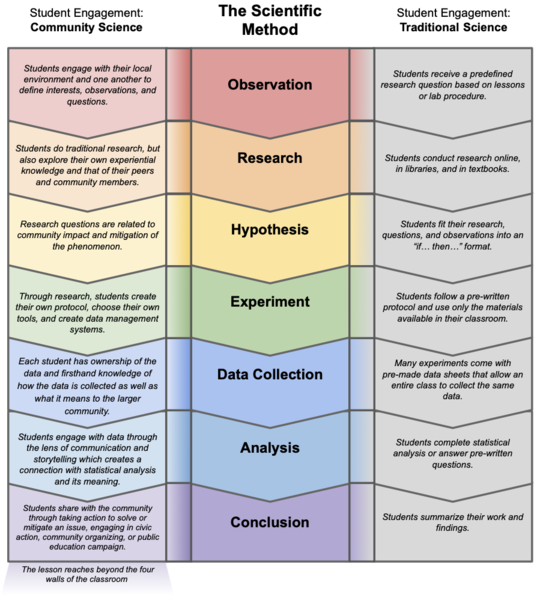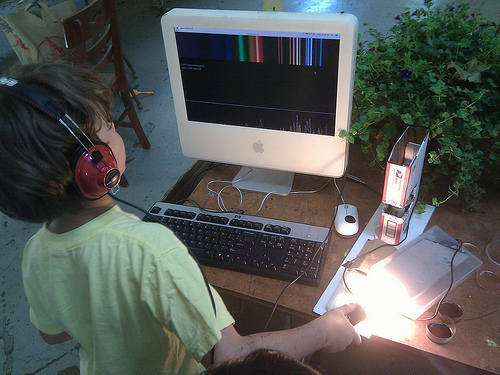#Welcome On this page you will find programming, activities, and resources related to formal and informal education. From here, you can: Join the conversation Learn how to integrate community science practices into your classroom Browse community science lesson plans from the Public Lab team Find activities for your classroom from the community Ask a question, answer a question, or follow future questions on education ## What Does Community Science Look Like in Your Classroom? Public Lab defines community science as community-led scientific exploration and investigation to address community-defined questions, allowing for engagement in the entirety of the scientific process. Unlike traditional citizen science, Public Lab’s approach emphasizes local and traditional knowledge, community ownership of research, and working together in scalable networks to encourage collaborative learning and civic engagement. [](/i/43663?s=o) Classroom community science projects are youth-led with an approach that emphasizes participant and community ownership of research, from question identification through analysis, and working together to encourage collaborative learning and civic engagement. After identifying their interests, students conduct research as they join the efforts of people and organizations already working on these issues and take the lead in aspects of study design, data collection, and analysis. The data collected from these student-designed projects supports community action and civic engagement. [Read more about integrating community science methodologies into your classroom here](https://publiclab.org/notes/mimiss/04-16-2021/community-science-in-the-classroom). **** ## How Can You Get Involved? We're looking to build a strong community of practice where educators of all experiences can share resources, knowledge, and lend a hand. Here are some ways that you can help build Public Lab's educational community ### Join the Conversation Get notified about new #education posts by subscribing to related tags. Click the button below, and subscribe to tags like "education", "classroom", "lesson", as well as other topics that you're interested in. Subscribe ### Try These Lessons in Your Classroom and Share Your Experience After using one of these activities in person, let us know how it goes in the comments. We appreciate your feedback and encourage you to share how you modify the lesson to better fit your classroom. - [Classroom Community Science](https://publiclab.org/wiki/student-led-community-science-in-the-classroom-a-curriculum): An adaptable curricula for bringing student-led environmental projects into your classroom. - [Messages from the Mississippi](https://publiclab.org/wiki/messages-from-the-mississippi-lesson-plans): A 6-part series investigating microplastics in local bodies of water culminating in student artwork and advocacy. - [Wetlands Remote Sensing & Management](https://publiclab.org/wiki/wetlands-lesson-plans): Hands on lesson plans to introduce students in grades 8-12 to oil spill cleanup, monitoring wetlands, and managing natural resources. - [Air Quality Class](https://publiclab.org/wiki/air-quality-class): An 8-week program in which students work with air quality sensors to monitor indoor air pollutants. Participants catalog and analyze the environmental air pollutant hazards that affect neighborhood homes and will share their findings with other community members ________________ ## Activities Here are some different activities particularly suited for use in the classroom: [activities:education] **** ## Questions [questions:education] **** ## Resources To learn more about the methods, successes, and challenges in developing these programs, check out our reports and evaluations from these funded projects: 2021 National Academy of Sciences Project Evaluation: Community Science in the Classroom 2022 EPA Impact Report: Messages from the Mississippi 2022 EPA Environmental Education Evaluation: Messages from the Mississippi **For more information on funding resources for educators, [click here](http://publiclab.org/wiki/funding-sources-for-science-teachers) ** [](/i/47464?s=o)...
| Author | Comment | Last activity | Moderation | ||
|---|---|---|---|---|---|
| ayushi_gupta | " Great post! I am actually getting ready to across this information, is very helpful my friend. Also great blog here with all of the valuable infor..." | Read more » | over 5 years ago | |||
| warren | "@pdhixenbaugh wrote this up for working with a group of teenagers on #coqui kits -- https://publiclab.org/notes/pdhixenbaugh/08-22-2018/diy-science..." | Read more » | over 6 years ago | |||
| pdhixenbaugh | "For example, one hour is pretty tight. If you introduced and started building the coqui one lesson, and finished building and tested water sources ..." | Read more » | over 6 years ago | |||
| pdhixenbaugh | "+1 for the coqui! I just adapted it for a 2h lesson with 14-17 yr olds. I think it could work well with 6 graders provided you had enough time to g..." | Read more » | over 6 years ago | |||
| Bronwen | "Hi @Kmckeown -- your seminars sound great! I think that the microscopes and Babylegs would be a great fit for something like this.The 3D printer an..." | Read more » | over 6 years ago | |||
| stevie | "I ended up going with the LaMotte/Earth Force low cost Water Monitoring kit (Code 3-5886). I was able to find it for about $38 on Amazon. The kit s..." | Read more » | over 6 years ago | |||
| zengirl2 | "I think a fun way is using these Leaf Pack kits. " | Read more » | almost 7 years ago | |||
| Bronwen | "You might like some of the work that North Brooklyn Boat Club has been doing in their Ed Shed. They also have a nice workbook designed for kids tha..." | Read more » | almost 7 years ago | |||
| warren | "There are a number of kite designs posted at https://publiclab.org/wiki/kite-making -- some good leads there! " | Read more » | about 7 years ago |